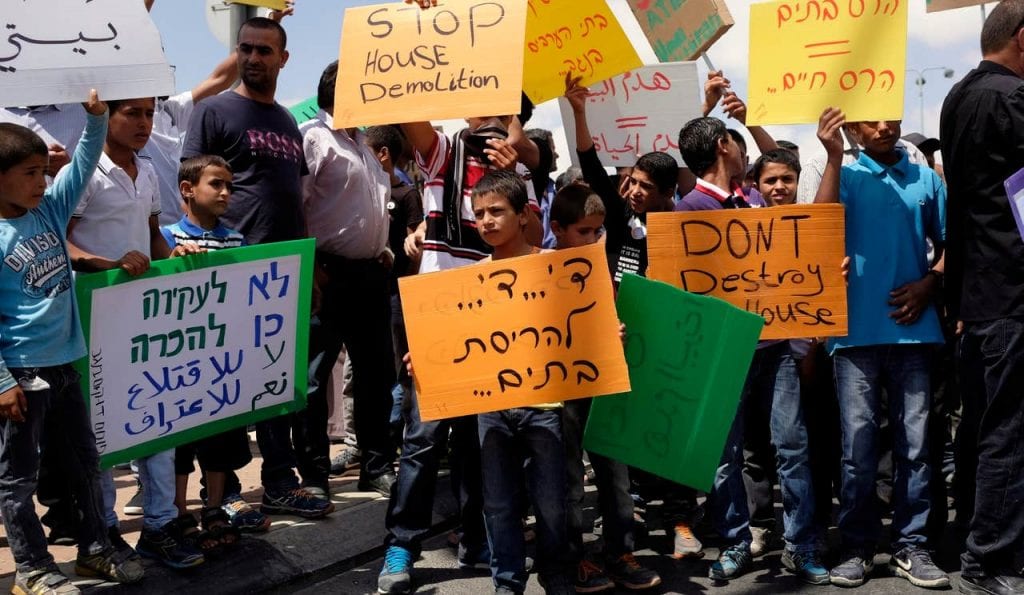
Negev Coexistence Forum for Civil Equality
פורום דו-קיום בנגב לשוויון אזרחי
منتدى التعايش السلمي في النقب من أجل المساواة المدنية
Fictitious Afforestation // Haia Noach
01.09.2020
In the previous decade, a fictitious afforestation policy was declared, for the purpose of taking over land. The excuse was ecological: a fight against the danger of desertification. After all, it is important to prevent the desert from edging into the Negev. To that purpose, it is essential to provide the loess (infertile) soils with a forest dressing. Recently, the climate crisis has also been enlisted to justify the aggressive forestry.
This policy has been accompanied by vigorous rhetoric of development for the sake of “preserving the land.” Is there a purpose or not? Is there a plan for ecological change or not? Is the policy compatible with the recommendations of ecologists? Are the plants resistant to desert conditions or will they wither because of them? It really does not matter much – the tractors raced to erase the desert.
And whose lands were they, those intended for planting? It is obvious that they are not Jewish-owned. The land belongs to the Arabs, but, of course, must be protected from them. They are defined as “trespassing” on it, even when they are its historical owners. North of Be’er Sheva, east of Road 40, a “Dudaim Forest” was planted. West of the same road, the “Mishmar Hanegev Forest” was planted. Thousands of acres of land registered in Bedouin ownership claims were covered with acacia and eucalyptus trees.
The policy was carried out without approved plans from the 22nd National Land Plan planning authorities for forestry and afforestation, while making up strange pretenses to justify the divergence from standard procedure. For example, in this way, on the lands of al-ʿArāgīb, located south of Rahaṭ, trees were planted on the pretext of agricultural necessity to protect the banks of streams from erosion. The areas around the historic village were covered with terraces and planting holes. What agriculture? What fruits? It is of no importance … agricultural plantings, it turns out, do not require a permit under planning and building laws.

Photo: Ilan Asaig
The afforestation in al-ʿArāgīb was blocked: a campaign among KKL-JNF donors revealed the potential for harm. The donors protested, and the plantings were abandoned. As of today, the court petition of the historic village’s residents, who refuse to abandon it, is blocking the rush to forestation. Residents reached out as far as Istanbul and London and collected evidence of their ownership of those lands. The court is still debating the resolution of the dispute.
But the drive for forestation did not stop: the tractors were sent to the unrecognized village of ʿAwajān, on the outskirts of the town of al-Lagiyyih. There the Goral Hills were covered with puzzling and unintelligible plantings. It would appear that their whole purpose is to encircle the neighborhoods of the village, to detach them from one another and to rift the regional continuity – all towards thwarting the recognition of the village and bringing about its addition to the town of al-Lagiyyih, which is a second home of many of its inhabitants.
Last year, plantings were held east of Tal as-Sabaʿ. About two months ago, the tractors unexpectedly reached the lands of the unrecognized village of Khirbit al-Watan, also to the east of Tal as-Sabaʿ. However, there they were stopped. The residents quickly organized a public campaign. The protest tent that they set up became a center of pilgrimage, and a place to learn about the aggressive plantings.
Approximately one thousand people demonstrated on June 22, 2020 in front of government offices in Be’er Sheva. They arrived in long convoys organized with the help of the Regional Council for Unrecognized Villages and the Steering Committee of the Negev Arabs. In addition, they held a protest vigil near Nevatim, and stood together opposite the JNF headquarters in Jerusalem. Everything was organized with determination, despite the Coronavirus.
As a result of the court petition filed by the Society for the Protection of Nature against the vaguely defined forestry policy, a committee for coordinating plantings was formed in 2015. The inter-ministerial committee is led by the Israel Land Authority (ILA) and is responsible for determining the planting areas and attributes. A search for the committee’s procedures and decisions on the ILA website will reveal … nothing! Why? Because the committee’s meetings are conducted in secret. Transparency? Don’t even mention the word.
The secretive committee is responsible for the planting of about 40,000 dunams of forest concerning which professional opinions are divided. Many ecologists claim that the intensive afforestation with trees that are not native to the Negev destroys habitats and unravel the natural texture of animals and plants.
But, in addition, afforestation is a means of denying the rights of the Bedouin, who have been waiting for justice since the establishment of the State of Israel, and, of course, it also undermines the fabric of Arab-Jewish relations in the Negev. The plantings, irrational as they are, are strategic in that they establish a reality of spatial hierarchy defining those that have rights and those that are deprived of rights.
Ironically, as of today, the funding for the afforestation frenzy now does not come from national funds, but rather from the socio-economic five-year plan that is ostensibly designed to reduce gaps and empower the Bedouin authorities. However, when the five-year plan was submitted for governmental approval, some of the Governmental Ministers agreed to support it only if it included resources to limit the Bedouin’s steps. Thus was born a Kafkaesque decision, a hybrid, on one hand promoting the social and economic rights of the Bedouin while, at the same time, allocating 30 million NIS to advance programs that deny their rights to the land.
This paradoxical decision is not accidental: the pretenses of “land preservation” and “prevention of desertification” are a thin greenish vocabulary used to hide the intention to protect the superiority of one national-ethnic group over another. Thus, the government, which joyfully decides to “adopt the international agenda of sustainable development”, actually promotes a policy with the specific intention of exploiting environmental concerns to deny social and environmental justice.
Haia Noah, CEO of the Negev Coexistence Forum for Civil Equality
Originally published in Haaretz (in Hebrew)

 Youtube
Youtube
 Twitter
Twitter
 Facebook
Facebook